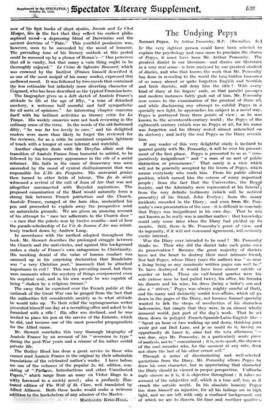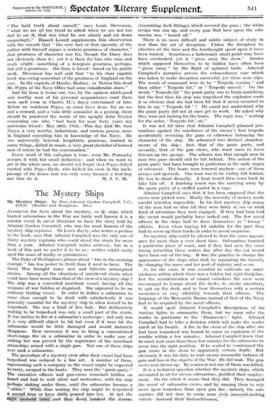The Undying Pepys
Samuel Pepys. By Arthur- Ponsonby, M.P. (Macmillan. 5s.) IF the very rightest person could have been selected to explain the psychology and once more to proclaim the charm of Pepys, it must have been Mr. Arthur Ponsonby. The greatest diarist in our literature—and diaries are literature in a very real sense—is here analysed by our greatest student of diaries, and who that knows the work that Mr. Ponsonby has done in revealing to the world the long-hidden treasures of so many almost or quite forgotten English and Scottish and Irish diarists, will deny him the title ? With every kind of diary at his fingers' ends, so that parallel passages and modern instances fairly gush out of him, Mr. Ponsonby now comes to the examination of the greatest of them a11; and while disclaiming any attempt to exhibit Pepys in a specially new light, he approaches his subject in a novel way. Pepys is portrayed from three points of view : as he was known to the seventeenth-century world ; the Pepys of the eighteenth century (which was no Pepys at all, for his name was forgotten and his library rested almost untouched on its shelves) ; and lastly the real Pepys as the Diary reveals him.
If any reader of this very delightful study is inclined' to quarrel gently with Mr. Ponsonby, it will be over his present- ment of the first phase. Pepys is presented to us as " com- paratively insignificant " and " a man of no sort of public distinction or prominence." That surely is a view which will not be generally accepted by the lovers of Pepys, which means everybody who reads him. From his public official position, which earned him the esteem of many important people ; from the fact that the Universities, the Royal Society, and the Admiralty were represented at his funeral; from the very definite testimony (which will be noticed presently) of his friend, John Evelyn ; from the many incidents recorded in the Diary ; and even from Mr. Pon- sonby's own presentation of the case—it is difficult to concludC that Pepys was insignificant in his own day. That he wit; not known as he really was is another matter : that knowledge could only come later when the Diary had yielded up its secrets. Still, there is Mr. Ponsonby's point of view, and its ingenuity, if it will not command agreement, will certainly excite interest.
Was the Diary ever intended to be read ? Mr. Ponsonby thinks no. Then why did the diarist take such pains over its preservation ? Because the great majority of diarists have not the heart to destroy their most intimate friend; Nor had Pepys, whose Diary (says the author) was " as near a living being as any inanimate written pages can well
To have destroyed it would have been almost suicide or murder or both. Those six calf-bound quartos were his wife (whose nose he had pulled twice), his office, his friend:* his dinners and his wine, his dress (being a tailor's son and also a " striver," Pepys was always mighty careful of that), and his many and distinctly sordid love-affairs, which all go down in the pages of the Diary, not because Samuel specially wanted to lick the chops of recollection of his shameless indecencies, but simply that they were, in an almost wholly immoral world, just part of the day's work. That he set them down in polyglot French-Spanish-Latin-English like-
" Spent an hour or two walking up and down, thinking pars avoir got out Doll Lane, sed je ne could do it, having no opportunity de hazer le, ainsi lost the tots afternoon "- was due, says Mr. Ponsonby, in a particularly acute piece of analysis, not to " concealment ; it is, so to speak, the shyness of the cool recorder who, for the moment at any rate, does not share the lust of his other errant self."
Through a series of discriminating and well-selected quotations from the Diary. Mr. Ponsoriby allows Pepys to draw his own character, but in appreciating that character.
the Diary should be viewed in proper perspective. Unflinch- ingly sincere as it is, it is objective throughout : it takes no account of the subjective self, which is a true self, too, as it struck the outside world. In his absolute honesty Pepys has done himself an injustice, for all his failings are in high light, and we are left with only a confused background, out of which we are to _discern his finer and worthier qualities.
" The bald truth about oneself," says Louis Stevenson, " what we are all too timid to admit when we are not too dull to see it, that was what te saw clearly and set down unsparingly." Russell Lowell _supplements _this observation with the remark that " the very fact of that sincerity of the author with himself argues a 'certain greatness of character." And greatness of character was his, though the Diary does not obviously show it ; yet it is there for him who runs and reads aright—something of a bourgeois greatness, perhaps, but still a greatness. His fame is broad—based on his public work. Stevenson has well said that " to his clear capable head was owing somewhat of the greatness of England on the seas. In the exploits of Hawke, Rodney,- or Nelson this dead Mr. Pepys of the Navy Office had some considerable share."
And his fame is borne out, too, by the opinion which good and worthy men of his personal acquaintance (and there were such even in Charles II.'s days) entertained of him. Before we condemn Pepys, as some have done, for an ass and a coward, and a vain little sensualist in a periwig, there should be pondered the words of the upright John Evelyn concerning one who " had been for near forty years my particular friend : May 26th, 1703.—This day died Mr. Sam Pepys, a very worthy, industrious, and curious person, none in England exceeding him in knowledge of the Navy. He was universally beloved, hospitable, generous, learned in many things, skilled in music, a very great cherisher of learned men of whom he had the conversation."
Every word of this eulogium is true—even Mr. Ponsonby accepts it with but small deduction ; and when we want to get at the whole man, we should not forget I hat Pepys-Jekyll existed with Pepys-Hyde, who kicked his cook in the back- passage of his house and was only sorry because a foot-boy































































 Previous page
Previous page